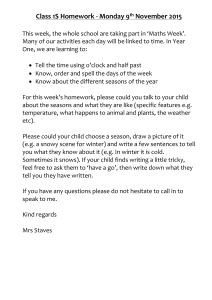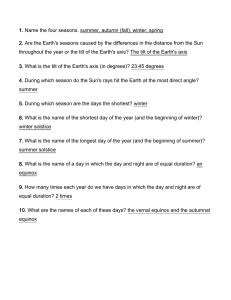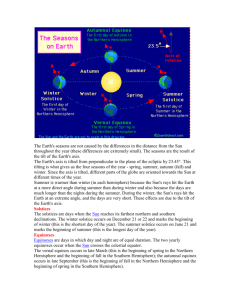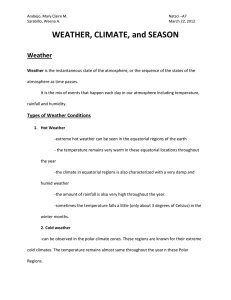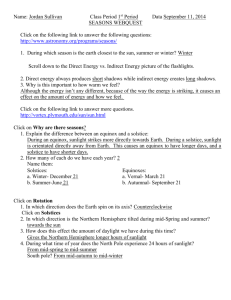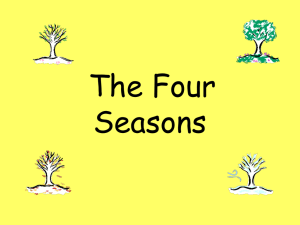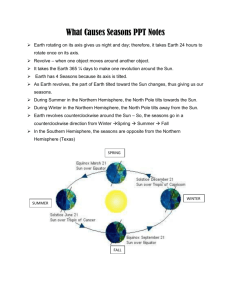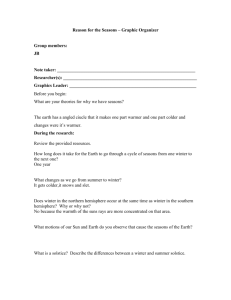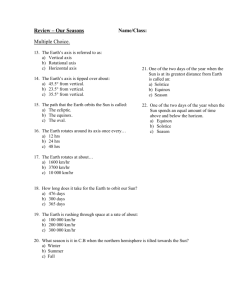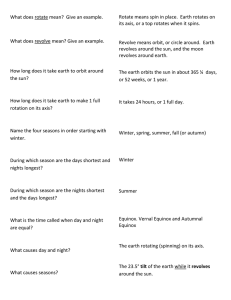weather, climate, season - NATSCI-A7
advertisement
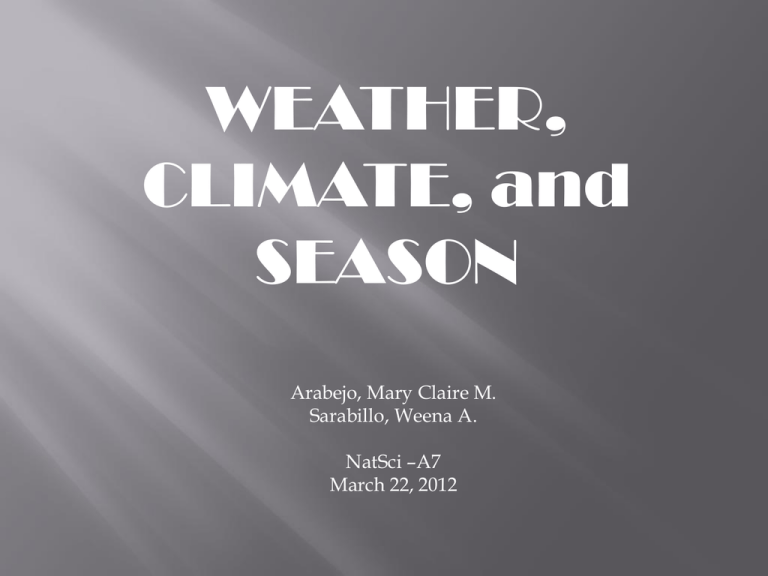
WEATHER, CLIMATE, and SEASON Arabejo, Mary Claire M. Sarabillo, Weena A. NatSci –A7 March 22, 2012 WEATHER Weather is the instantaneous state of the atmosphere, or the sequence of the states of the atmosphere as time passes. It is the mix of events that happen each day in our atmosphere including temperature, rainfall and humidity. Types of Weather Conditions 1. Hot Weather -extreme hot weather can be seen in the equatorial regions of the earth - the temperature remains very warm in these equatorial locations throughout the year -the climate in equatorial regions is also characterized with a very damp and humid weather -the amount of rainfall is also very high throughout the year. -sometimes the temperature falls a little (only about 3 degrees of Celsius) in the winter months. 2. Cold weather -can be observed in the polar climate zones. These regions are known for their extreme cold climates. The temperature remains almost same throughout the year n these Polar Regions. 3. The weather in the mountainous regions is known as the mountain weather. The climate of those regions is generally cold enough. New Zealand comes under those high countries that enjoy the mountain weather conditions. CLIMATE Climate - is the average weather pattern in a place over many years. Climates are changing -because our Earth is warming, according to the research of scientists Types of Climate 1. Mediterranean Climate -are dry in the summer and wet in the winter. Summers may last for as long as five months and are extremely dry due to subtropical highs' sinking air. 2. Oceanic Climate -this type of climate has precipitation that occurs throughout the year. The cold season sees the most precipitation. 3. Humid Continental Climate -This type of climate is a mix of both temperate climate and humid climate. Main characteristics include a cold winter, a warm summer, and precipitation throughout the year. 4. Subarctic Climate -The subarctic climate is a type of climate that consists of brief, warm summers, and long and very cold winters. SEASONS Seasonal Changes - seasons are all created because the Earth actually sits on a small tilt -since we are at a tilt, different parts of the planet are warmer during different times of the year -with the tilt, our year is broken up into four seasons. Types of Season 1. Summer Summer is the warmest time of year. It's not because the planet is that much closer to the Sun, it's because the top part of the Earth is facing the Sun for a amount of time. The longest days of the year occur during the summer months. June is the time of the summer solstice, the longest day of the calendar year. The time of the solstice is determined by the location of the Sun. 2. Fall/Autumn Fall sees the planets axis directly in line with the Sun. The Sun is directly over the Equator during the autumnal equinox (September) and heating the northern and southern hemispheres equally. As the northern hemisphere is moving towards shorter days and the cold winter, the southern hemisphere is watching the snows melt and the flowers bloom during their spring. 3. Winter This is the season where the Earth is tilted way from the Sun and the South Pole is getting all of the light. It's almost constant night during the cold nights in the North Pole. 4. Spring Spring is a time for rebirth and emerging from the short and cold days of winter. While the northern hemisphere sees spring from March through June, it is fall in the southern hemisphere. March is the time of the vernal equinox that signals the official start of spring. As far as the position of the planet, it is a bit of a mirror image to our position in autumn. The Sun is directly over the Equator during the equinox and the northern and southern hemispheres are receiving about the same amount of the Sun's energy. Spring events include blooms of wildflowers, new leaves on trees, warmer days that winter, and wetter weather (not snow). References: http://www.atmosphere.mpg.de/enid/1__Weather___Fronts/_Weather_and_Climate_15x.html file:///C:/Users/user/Downloads/Weather%20and%20Climate%20Ba sics.htm http://www.tropicalweather.net/weather.html http://www.brighthub.com/environment/scienceenvironmental/articles/96369.aspx# http://www.ehow.com/about_5090734_different-kinds-weatherconditions.html http://www.mapsofworld.com/referrals/weather/types-of-weather/ http://www.geography4kids.com/files/climate_seasons.html
